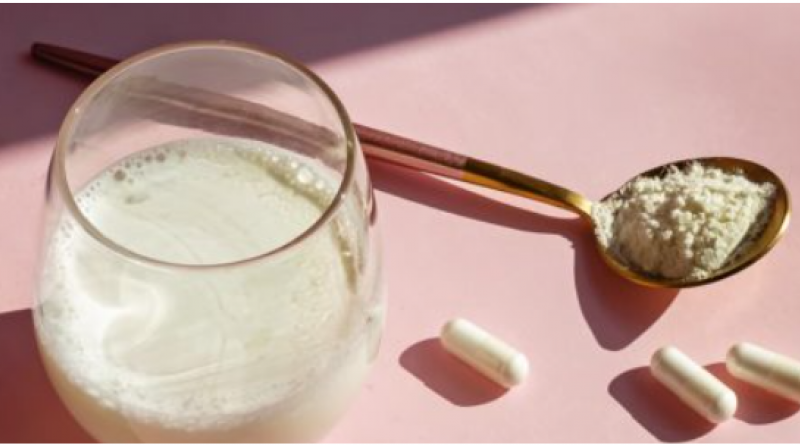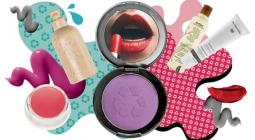Should You Really Consume Collagen? Don’t Fall for Greenwashing.

Collagen is the most plentiful protein in the human body and a major building block of connective tissue found in skin, bones, muscles, ligaments, tendons, and many other body parts. Most notably, though, collagen benefits the elasticity and hydration of the skin. As we age, and the body produces less collagen, dry skin and wrinkles are the result. Enter the latest must-have product in the never-ending search for the fountain of youth: collagen supplements. Enter the latest argument about what “environmentally friendly” really means.
Quality Collagen Beverage or Kardashian Kool-Aid?
While some people make sure collagen-rich foods like egg whites, fish, chicken, soy, garlic, and certain herbs are a consistent part of their diet, others prefer to get their collagen in just a few convenient gulps. Kourtney Kardashian touts the massive benefits of a hot collagen beverage as a morning ritual she religiously observes. And anything with a Kardashian stamp means millions of others are following suit, including one brave journalist who claims this Kardashian Kool-Aid made her more attractive, if only for the day.
In 2020 in the United States, it was expected that consumers would spend $293 million on collagen supplements, up from $50 million in 2014. And why not? It is believed that collagen has a variety of health benefits. Along with slowing skin’s aging, collagen is promoted as providing relief for joint pain, boosting muscle mass, preventing bone loss, and improving heart health. There are also unsubstantiated claims that collagen is good for brain health, gut health, mood, hair, nails, and weight loss.
But what’s really in a collagen beverage or collagen supplements? How safe are they? Are they environmentally friendly? And is there no such thing as just aging gracefully anymore?
Where Does Synthetic Collagen Come From?
If adding collagen to your diet is something that interests you, it is important to understand where this supplement comes from and whether it will really do a body good. If you’re a vegetarian or vegan, or simply trying to embrace a more plant-based diet, collagen could put a wrench in your efforts.
AminoFacts, an independent nonprofit that strives to bring transparency to sourcing and production processes around food grade amino acids, has reviewed leading collagen and collagen-boosting supplements and are making it known that:
- Many collagen products, if not all, are hydrolyzed and go through a chemical process that breaks down the collagen protein into peptides for faster absorption but results in harsh chemical agents like hydrochloric acid.
- Collagen supplements are made with materials derived from animal parts and many have fillers and other additives.
- Manufacturing of collagen uses the inedible parts of slaughtered animals, like hooves, hair, skin, feathers, and teeth from cows, chickens, pigs, and other creatures.
The contents of collagen products will sound unappetizing to most people, but the ingredients are even more disturbing to those who support animal welfare or practice a plant-based lifestyle. Not knowing where collagen products come from only to discover later that you have ingested something you do not fundamentally agree with can be devastating. Very few collagen products disclose how they treat the animals from whom the products are sourced.
AminoFacts is calling on collagen producers to be more transparent about the animal sources used in their manufacturing process, particularly for the plant-based and socially and environmentally conscious consumers who have great concerns about what is in their food and — it follows — what goes into their bodies.
For manufacturers who need convincing of the value of such transparency, the vegan food market was valued at $14.2 billion in 2018. That number is expected to climb to over $31 billion by 2026.
The Greenwashing of Collagen Products
Labels on collagen products do not always indicate the source of the collagen. In fact, reading the labels is not insightful in most cases. They typically include vague marketing language like gluten-free, dairy-free, or keto- and paleo-friendly — all categories that collagen falls into naturally without any special processing. Words like these are greenwashing their product by making environmental claims that can be misleading to conscientious consumers.
If you believe collagen supplements are the next best thing in your search to improve your body, appearance, and mind, there are plant-based alternatives that are truly vegan and formulated to help the body produce its own collagen. Described as collagen enhancers or boosters, these alternatives are made following the natural method of fermentation that creates amino acids from plant materials in a process much gentler than animal hydrolysis. Such products also tend to offer more transparent labeling so you can feel better about what you’re buying and using, whether you’re gulping it like a Kardashian or popping some vitamins.
22 February 2021
Earth911




